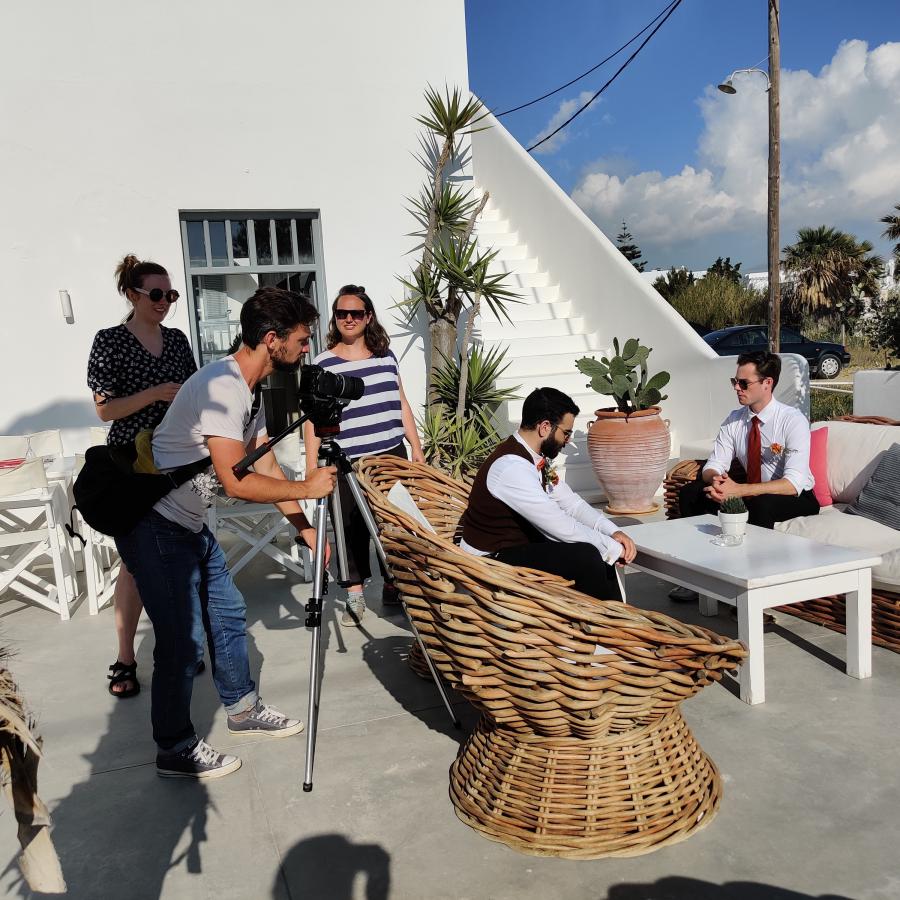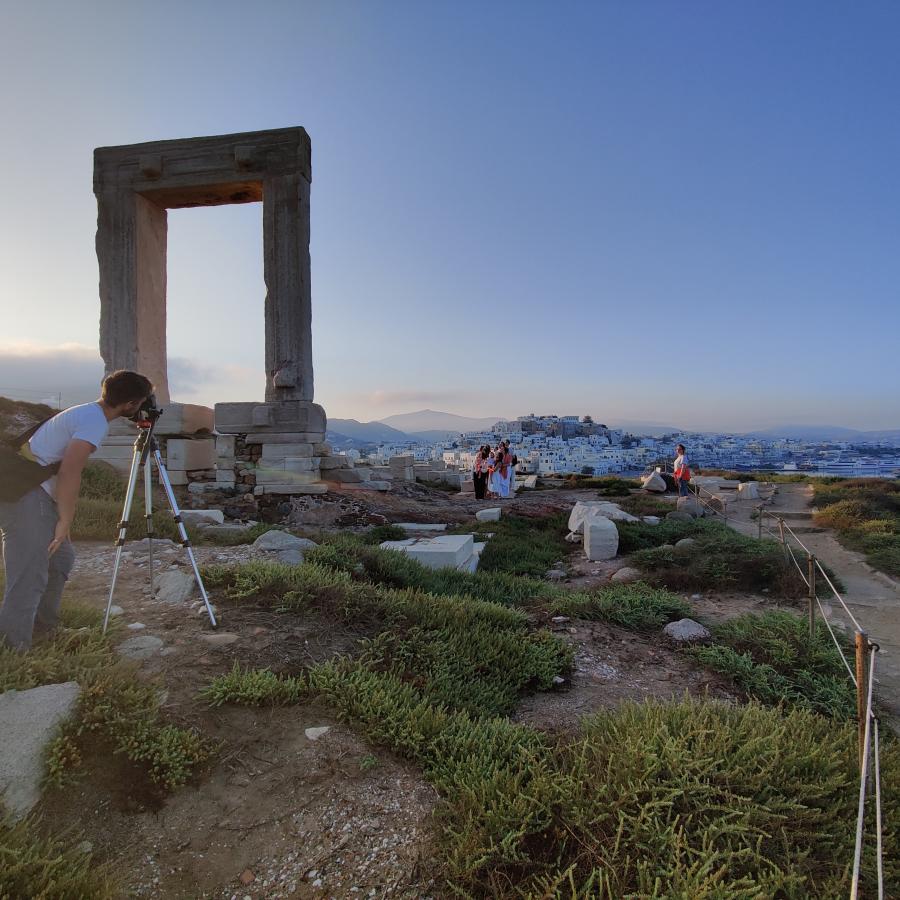Studying Ancient Greek? Interesting.
Singing a long-lost Euripides play in Ancient Greek on the sun-dappled shores of an island in Greece filmed by a professional movie crew? A once-in-a-lifetime educational experience.
That’s just one example of a Global Seminar. These special offerings—led by UBC faculty and supported by Go Global—represent an extraordinary opportunity. That is for UBC students in a small group to dive deeply into a topic with a UBC professor in context-rich locations around the world.
After a COVID-19 interruption that began in 2020, in-person Global Seminars are back. Imagine studying the social and environmental aspects of conservation while immersed in the communities caring for the land in South Africa’s Kruger National Park or sitting down with Hawai'ian communities to hear first-hand about the very real effects of climate change.
This year marks the most Global Seminars ever offered: 30 in all from both the Vancouver and Okanagan campuses. Some 400 UBC students will be travelling to 26 countries this year led by professors from 25 departments across eight faculties. Participating students are receiving over $850,000 in student awards for Global Seminars in 2023, drawing from: Go Global International Learning Awards; the UBC Pathfinder Award; Arts Research Abroad Awards (the UBC Faculty of Arts Dean’s Office); and the Government of Canada’s Global Skills Opportunity program.
Most 2023 programs are new: for example, the FEST Film Festival Program in Espinho, Portugal; The Sibiu International Theatre Festival in Sibiu, Romania; the four new Forestry field schools in Ecuador, Chile, Europe and South Africa; French Literature in Lyon; and Romance Studies in Barcelona.
The call is out now for UBC faculty to put in proposals to lead a Global Seminar of their making in summer or Reading Week 2024. The deadline to propose a new Seminar is June 30.
Go Global supports Global Seminar faculty program directors on program development, financial management, promotions, student selection, risk management, and funding. The best programs emerge from long-standing research relationships that faculty have with the local host communities.
There are new funding opportunities available this year, including a faculty travel grant for program and partnership development; subsidies for new programs in the first year to lower the costs for students; and grants promoting inclusion of students with disabilities in Global Seminars.
Ancient Greek in Greece
Linking texts to sites with performance conventions and traditions, Theatre Studies Assistant Professor Hallie Marshall took 14 students to Greece last summer to study Ancient Greek theatre, performance and context. She says the in-person immediacy leads to a fundamental perspective shift for students—especially those who haven’t had the opportunity to travel—in how they see themselves related to the world. Even hearing a different language, observing cultural differences and other ways of living have profound effects. Dr. Marshall’s students were especially taken with the Greek practice of communal table—ordering dishes for sharing. Dining alone won’t ever feel quite the same, she says.
For the Theatre Studies Global Seminar on the Greek island of Naxos last summer, the class collaborated on a seven-minute film inspired by a fragment of the lost drama Phaethon by Euripides. Students performed in the original Ancient Greek, exploring the text with director Helen Eastman, composer Alex Silverman and producer Mairin O' Hagan. Department of Theatre and Film’s Dr. Hallie Marshall ran the program, supported by a SSHRC Connection grant. (Video: BareFacedGreek/YouTube)
“So much of what we study is in the classroom; I show them pictures, we look at things in textbooks,” says Dr. Marshall, with the Department of Theatre & Film. “But the distance between what you see on a slide on campus at UBC and actually walking through the streets of Athens—and realizing people walked those same streets for thousands of years—makes it real for them in a way the classroom just can’t.”
Thanks to a “whole bunch of strands coming together that, in a different context, wouldn’t be possible,” the class produced a seven-minute movie on Naxos. A choral ode from Euripides’ tragedy Phaethon (which survives only in fragments) inspired the production—directed by Helen Eastman, with composer Alex Silverman and producer Mairin O' Hagan, and starring the students singing in the original Ancient Greek. The collaboration with the UBC program, along with funding from a SSHRC Connection Grant, allowed the makers to create a film of a song from an Ancient Greek play, a project which requires a large cast and would otherwise be financially unviable. The students got to apply their course work towards artistic creation and dabble in acting with seasoned professionals. “Some went really far out of their comfort zones,” Dr. Marshall says. “Let’s face it, no one is comfortable singing in Ancient Greek!”
Sustainability in Hawai'i
Typically, Global Seminars are intense, with programming daily from 8 to 6, then evening course reviews, activities and social outings.
For the nine-day Island of Hawai'i field course on Systems Approaches to Regional Sustainability in February 2023, Faculty of Science Professor Lee Groat and Integrated Sciences Lecturer Denise Gabriel took students through the scientific problem-solving process of understanding how factors influence one another as a whole in the context of interwoven relationships.
In addition to abundant research proving that learning by doing is among the best methods, on-location courses also represent an opportunity to see and experience things one can’t at home, Dr. Groat says. “In Iceland, for example, we take the students to the town of Höfn which is beside the Vatnajökull ice sheet,” he says. “The ice sheet is melting so fast that Höfn is rising by 2 cm a year. This is playing havoc with water and sewer lines, and the harbour is drying out. These are direct impacts of climate change of the type we are not yet experiencing here.”
Another experiential benefit, Dr. Groat says, is it builds resilience through shared experiences such as outdoor activities and hostel living. The group got to know Hawai'ian land, ecosystems and communities in person, listening to residents and local experts against a backdrop of active volcanoes, deep, dark lava tubes, sulfur banks, plastic ocean pollution, invasive species and climate change impacts. Students also tried snorkeling and body surfing in the signature powerful surf.
UBC undergrad Josh Lee still recalls the thrill of pondering his learnings while steaming in the natural hot springs carved from a 2018 volcanic eruption lava flow under discussion. “I never thought in my four years at UBC I’d ever be doing anything like that!” says Lee, a fourth-year human geology major with an urban studies minor.
“You always think of Hawai'i as beaches and sunsets, but people don’t consider the Indigenous aspect when they travel to a vacation destination,” he says. “We talked with a native Hawai'ian park ranger who described the conflict between native Hawai'ians working as park rangers and some in their community who say they’re ‘selling out’ because they are now working for the same government which originally took their land. For me, that was an eye-opener.”
It's as much about the academic experience, Lee says, as venturing into the unknown as well as the social connections formed within the small group—an intense bonding experience almost like a second family. “I hope everyone can have this type of global experience at some point,” he says.
Policymaking in the EU HQ
Professor Kurt Huebner is a veteran. He has worked with Go Global on a European field school for 17 years. Dr. Huebner led the three-week Global Seminar European Study Tour in May 2019, as well as the subsequent two-month student internship with EU institutions. After adapting the program to a virtual experience in 2021 and 2022, he’s returning to the in-person program this May. Each year, the research seminar explores overarching topics. For 2023, it’s energy security vs policies.
“The EU is very ambitious in terms of climate policy,” Dr. Huebner says, “But with the Ukraine invasion [by Russia], now they have to secure energy and fossil fuels—so how do they manage that tension?”
The program will visit the European Central Bank in Frankfurt, Germany, and Luxembourg’s Court of Justice or NATO in Brussels, Belgium to hear about climate-supportive policy with the department director. They will talk EU relations with the Ambassador to Canada or policy-making with a high-level rep at the EU Commission. Students write one blog post per week capturing their insights.
The 12th European Union Study Tour program: UBC students embarked on an intensive 21-day tour of institutions in four EU member states—Belgium, Luxembourg, Netherlands and Germany—in May 2015. (Video: Selma A-B/YouTube)
In addition to seeing Europe and its distinctive medieval towns—many students for the first time—the biggest perk is networking, says Dr. Huebner, Jean Monnet Chair for European Integration and Global Political Economy, and Chair for German and European Studies, professor of European integration for political science:
“Many [Global Seminar] groups from five or six years ago are still in contact with their Facebook groups,” he notes. “That’s a very important aspect. Reading in textbooks is fine, but we speak to human beings designing policies, who talk about how difficult it is sometimes to operate with 27 member states; how challenging it is to come up w compromises—sometimes the lowest common denominator.”
At its core, the immersive experience is about “training the next Canadian generation of EU policy experts,” Dr. Huebner explains. “Canadians need to understand how Europeans tick, and the other way around. And then there’s the cultural element of it. It’s an investment in their own future.”
Teaching a Global Seminar
For faculty teaching Global Seminars, one needs to be tolerant and adaptable, Dr. Groat says.
Dr. Huebner adds to those attributes: professors with an intrinsic interest and dedication to the topic. “They need strong support in their department because setting up the Global Seminar abroad is an enormous amount of work,” he says, “though it’s treated like any other course. That said, it brings a lot of benefits.”
One of those is rekindling the enthusiasm academics feel when they first began researching their chosen subject matter at the outset of their careers. “For me, it allows me to see students in much closer proximity with the material I’m passionate about and see their excitement: taking students and sharing in that way—and sharing their joy and intellectual curiosity about what we study,” Dr. Marshall says.
She hopes more and more students—especially those who have never left the Vancouver Lower Mainland—can reap the benefits of a global experience. But cost is a barrier. For the 2022 Greece seminar, the Arts Research Abroad (ARA) program covered 70 to 100% of student costs. With ARA funding coming to an end after 2024, what is needed now is ongoing financial support—for all Go Global programs, says Dr. Huebner.
“These courses and experiences really are investments,” he says. “But you need some kind of capital to invest in the future on the side of diversity. When we don’t have to think about the cost so much, selecting students is so much easier. For those students who need to work in the summer to save for tuition, it’s twice as expensive. So we need dedicated funding to make it accessible for all.”
UBC faculty: Send in your proposal to teach a Global Seminar by June 30.
UBC-Vancouver Faculty: Find information about Global Seminars.
UBC-Okanagan Faculty: Find information about Global Seminars.



